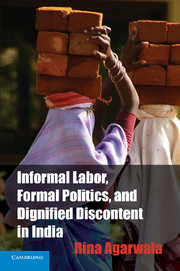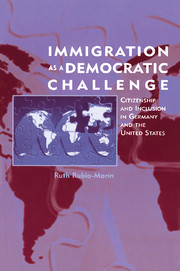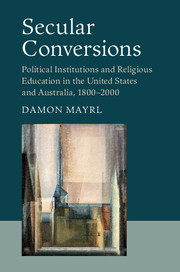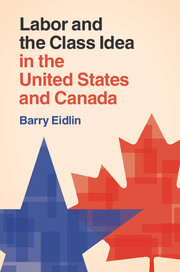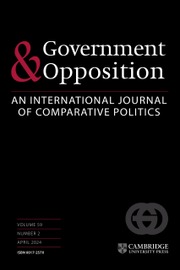Employer and Worker Collective Action
A Comparative Study of Germany, South Africa, and the United States
- Author: Andrew G. Lawrence, Vienna School of International Studies
- Date Published: August 2014
- availability: Available
- format: Hardback
- isbn: 9781107071759
Hardback
Other available formats:
eBook
Looking for an inspection copy?
This title is not currently available for inspection. However, if you are interested in the title for your course we can consider offering an inspection copy. To register your interest please contact [email protected] providing details of the course you are teaching.
-
This book compares sources of worker and employer power in Germany, South Africa, and the United States in order to identify the sources of comparative US decline in union power and to more precisely analyze the nature of labor-movement power. It finds that this power is not confined to allied parties, union confederations, or strikes, but rather consists of the capacity to autonomously translate power from one context to the next. By combining their product, labor market, and labor law advantages through their dominant employers' associations, leading firms are able to impose constraints on labor's free collective bargaining regionally and nationally, defeating employer interests that are more amenable to labor in the process. Through an examination of these patterns of interest organization, the book shows, however, that initial employer advantages prove to be contingent and unstable and that employers are forced to cede to more far-reaching demands of increasingly organized workers.
Read more- Compares employer and worker collective action in a single analytical framework
- Compares countries from both the wealthy North and the developing South
- Illustrates how relational strategies of power are unstable, change over time, and are open to translation
Reviews & endorsements
'What unions can do in theory, versus what they can achieve in practice, varies too widely to be accounted for by institutional variables alone. Andrew Lawrence's theoretically sophisticated and empirically rich study of unions and employers organizations in the United States, Germany, and South Africa shows us how labor power is a relational rather than a structural property that allows the translation of resources from one domain to another. Ability and agency, rather than capacity or density, are the keys to understanding the diverse patterns of workers' collective action.' Mark Blyth, Brown University
See more reviews'Employer and Worker Collective Action is a trailblazing analysis of how interrelationships among capital, labor, and the state have shaped the distinctive trajectories of the political economies of Germany, South Africa, and the United States. Further, Lawrence's claims regarding the forces, relationships, and politics of the capitalist mode(s) of production have relevance far beyond the three cases; they promise to influence future research agendas in sociology, political science and political economy.' Mark Kesselman, Columbia University
'Andrew Lawrence's Employer and Worker Collective Action steps boldly outside the norm in political science, examining a truly important question from a unique vantage point. Lawrence's analysis of the politics of labor markets and movements in both the developed and developing worlds is theoretically sophisticated, rigorously detailed, and genuinely pathbreaking. It contains invaluable resources for anyone hoping to understand labor politics in today's world.' Jason C. Myers, California State University, Stanislaus
'Andrew Lawrence's wide-ranging research on employer and worker collective action in Germany, South Africa, and the United States is a unique contribution to understanding the significance of institutional contingencies in the historical growth and decline of unions. Retaining a hopeful appraisal of the future of trade unions, this scholarly book should be an important addition to the literature on labor and comparative politics.' Immanuel Ness, Brooklyn College, City University of New York
'Andrew Lawrence has written a masterful addition to the comparative literature on labor regimes. Careful, scholarly, and comprehensive, Lawrence uses the cases of Germany, South Africa, and the United States to develop an original framework that maps the rise and decline of labor power. An important book that contributes to our understanding of the impasse that unions and labor parties confront.' Frances Fox Piven, The Graduate Center, City University of New York
Customer reviews
Not yet reviewed
Be the first to review
Review was not posted due to profanity
×Product details
- Date Published: August 2014
- format: Hardback
- isbn: 9781107071759
- length: 360 pages
- dimensions: 236 x 157 x 27 mm
- weight: 0.65kg
- contains: 3 b/w illus. 12 tables
- availability: Available
Table of Contents
Part I. Power in Theory and Context:
1. Contending theories of labor power
2. Contextualizing workers' power
Part II. Employer Strategy and Collective Action:
3. Varieties of firm strategy: monopolization, cartelization, and concentration
4. Varieties of employer associations: origins, development, and divergence
Part III. Workers: Outlaws, in the Law and by the Law:
5. Failed incorporation and union response
6. Varieties of juridification
Part IV. From Postwar Golden Quarter Century to Post-Cold War Interlude:
7. The golden quarter century: revival, containment, or decline?
8. Union and employer relations after the golden quarter century
Part V. Collective Action before and in the Global Economic Crisis:
9. From tripartism to global crisis
10. Conclusion: doing the work of crisis without crisis?
Sorry, this resource is locked
Please register or sign in to request access. If you are having problems accessing these resources please email [email protected]
Register Sign in» Proceed
You are now leaving the Cambridge University Press website. Your eBook purchase and download will be completed by our partner www.ebooks.com. Please see the permission section of the www.ebooks.com catalogue page for details of the print & copy limits on our eBooks.
Continue ×Are you sure you want to delete your account?
This cannot be undone.
Thank you for your feedback which will help us improve our service.
If you requested a response, we will make sure to get back to you shortly.
×

